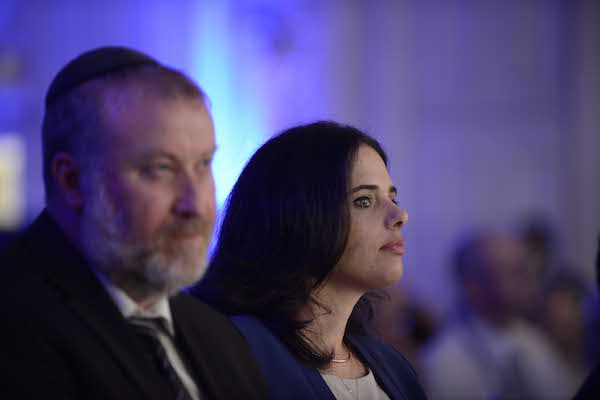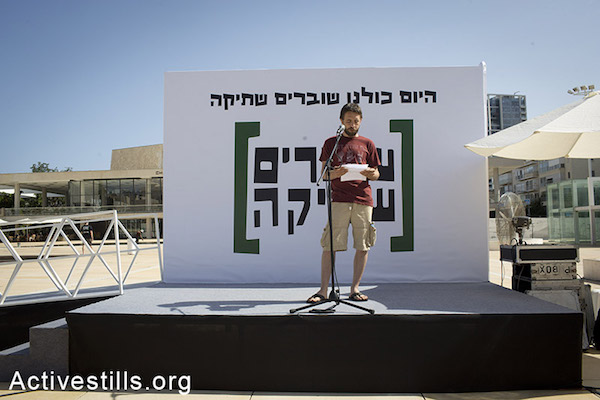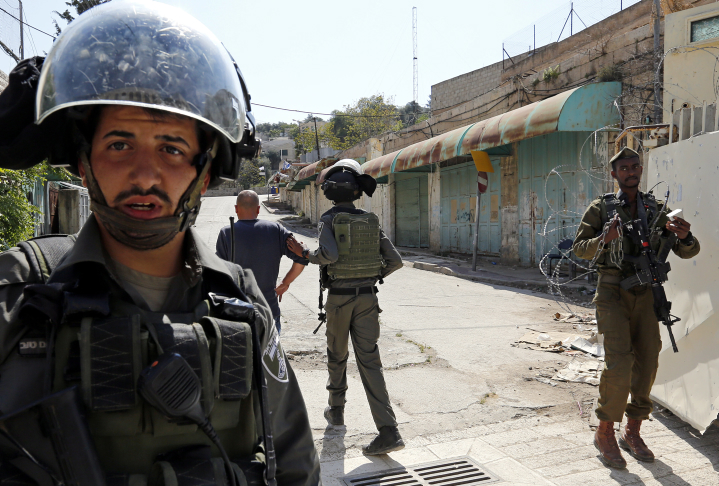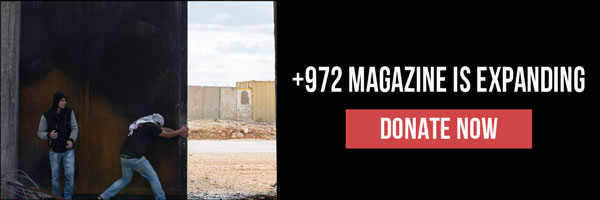That the minister of justice can singlehandedly launch an investigation against the anti-occupation group is a symptom of the decline of the rule of law and creeping authoritarianism within the Green Line.

It is not often that the justice minister of a country personally demands the investigation of a political adversary to prove they did not commit a crime. But that is precisely what happened last week in the absurd case of Dean Issacharoff, the spokesperson for Israeli anti-occupation group Breaking the Silence. The state prosecutor announced last Thursday that the investigation into Issacharoff’s claim that he badly beat a Palestinian during a protest in Hebron in 2014 had concluded due to “a lack of guilt.”
In fact, the investigation could not have ended any other way. After a video surfaced of Issacharoff describing a violent arrest he carried out during his military service, Justice Minister Ayelet Shaked personally called on the state’s attorney to look into Issacharoff’s claims. “In light of the great importance I see in safeguarding the reputation of the state and its soldiers,” Shaked wrote to Attorney General Avihai Mendelblit, “I thought it appropriate to turn to you to check the truth of the incident.”
The letter was little more than an order to find Issacharoff a liar; Shaked and others on the Right have repeatedly charged that Breaking the Silence, in the words of Prime Minister Netanyahu, “lies and slanders our soldiers around the world.”
Shaked’s direct intervention was an unprecedented use of the legal system to single out a non-governmental organization for attack. Former Attorney General Michael Benyair issued a strong statement condemning the investigation and Minister of Justice Shaked’s role. “The political show-investigation of Breaking the Silence spokesman Dean Issacharoff is a disgrace to the law enforcement system,” he wrote. “The law enforcement system has lost its independence and become an instrument of the regime against its political rivals.”
“What began under the political direction of the minister of justice became a political investigation that came to a tendentious and political conclusion,” Avner Gvaryahu, Executive Director of Breaking the Silence, said in response to the investigation’s closure.
The first victim
The case against Issacharoff comes at time of intense attacks on Israeli human rights organizations, and is part of a larger trend of eroding institutional norms in Israel. Without an effective opposition in the Knesset, civil society organizations have become the country’s de facto political opposition. Netanyahu, under numerous corruption investigations, has enlisted his backers in Likud for a parliamentary scorched earth campaign to deflect away public attention, taking aim at these NGOs, as well as Israel’s judiciary, and even the police.
Most recently, Likud MK Yariv Levin, under instructions from Netanyahu, is said to be preparing a new bill that will enable the government to shut down NGOs that criticize the IDF or advocate boycotts of Israel. If Issachroff’s case is any indication, the Right is aiming to make Breaking the Silence the new bill’s first victim.

The details of Issacharoff’s case are as absurd as the politics that undergird them. Shortly after the investigation was closed, two important developments came to light. First, Rueben Silberstone, a British lone soldier who served as a signal-operator in Issacharoff’s unit and witnessed the event, released a video online in which he confirmed Issacharoff’s account of what happened in Hebron. Silberstone was never questioned as part of the investigation.
Second, Issacharoff was never asked if the Palestinian who was questioned during the investigation was indeed the Palestinian he beat and arrested in Hebron. The state prosecutor claimed that it had questioned a man named Hassan Jolani, who contradicted the account Issacharoff gave. But Issacharoff was never shown a picture of Jolani, nor Jolani of Issacharoff. “If they had even asked me to identify the Palestinian at any stage of the investigation, I would have told them that this is not the person, and this is not the event,” Issacharoff stated in a video released online. “If they had checked this, would they still be calling me a liar?”

Minister of Justice Ayelet Shaked initiated the investigation with the explicit goal of discrediting Breaking the Silence — and the mainstream Israeli media has been more than happy to assist her. In true tabloid fashion, Yedioth Ahronoth, the country’s best-selling newspaper, ran the headline, “The case against Breaking the Silence spokesman closed: his claim that he attacked a Palestinian — false.” During a televised debate on Channel 2, Deputy Minister of Foreign Affairs Tzipi Hotoveli, back from her rocky tour of U.S. college campuses, announced to Gvaryahu, “You are all traitors.”
Creeping authoritarianism
It is no secret that maintaining military rule over the two-and-a-half million Palestinians in the West Bank requires Israeli soldiers to carry out acts of violence on a daily basis. And yet, the longer the occupation grinds on, the harsher the crackdown on those who openly talk about its effect on the soldiers who administer it and the Palestinians who live under it. It was only a matter of time before the repression required to maintain military rule on one side of the Green Line spilled over the separation wall and onto the other.
Using the legal system to attack human rights organizations that criticize the government’s policies is just the latest expression of that crackdown. That the minister of justice can singlehandedly launch an investigation against a political opponent is a symptom of the decline of the rule of law and creeping authoritarianism within the Green Line — and it’s not only those on the left who have begun to notice.
In his address during the Knesset’s opening session this year, President Reuven Rivlin, a member of Netanyahu’s Likud warned of the “ongoing attempt to weaken the gatekeepers of Israeli democracy.” If the bills on the docket targeting civil society groups are any indication, the worst may be yet to come.


